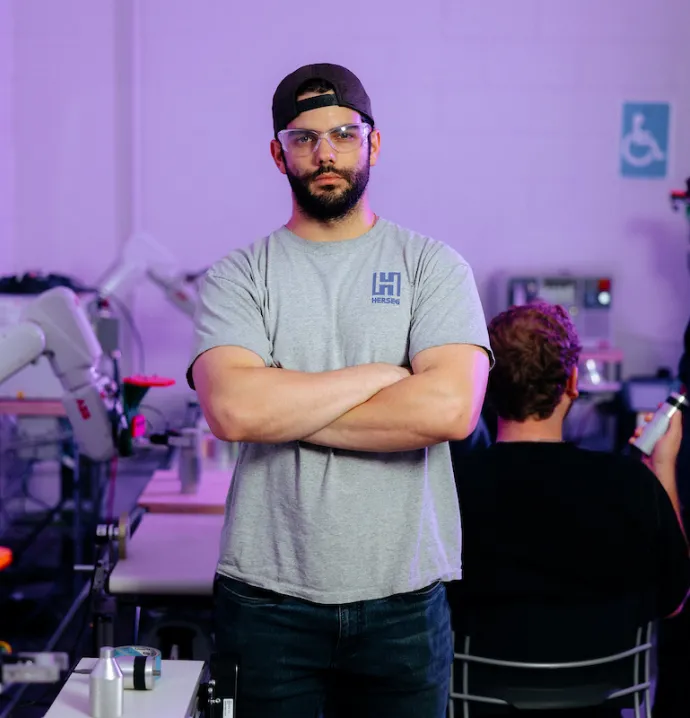UNI alum helping produce COVID-stopping drug
UNI alum helping produce COVID-stopping drug
UNI alum and process chemist Patrick Fier (‘09) is leading pharma giant Merck’s large-scale production efforts on what looks to be a dramatic life-saving breakthrough: A drug to stop COVID from spreading in people exposed to the virus before they need to go to the hospital.
The drug — Molnupiravir — is in large-scale clinical trials and is expected to get FDA emergency use authorization in October. Once it gets the go-ahead, a pharmacist could prescribe one pill twice a day for five days to stop the coronavirus in its tracks — before an exposed, vaccinated or unvaccinated person gets sick enough to require hospitalization.
The drug would stop a person who tested positive for COVID from getting sicker. It kills off the SARS-CoV-2 virus by causing errors that prevent the virus from replicating.
After a person is hospitalized with COVID symptoms, the disease is too far advanced for the drug to stop it.
“To take [the drug] as a prophylactic could be a huge game-changer, especially as the virus is mutating and potentially escaping immunity,” said Fier, 34, a Bettendorf, Iowa native who now lives in Monroe Township, New Jersey, near Merck’s headquarters.
The breakthrough science with global life-saving potential represents quite a journey for Fier, who transferred to UNI from Scott Community College. He was recently named one of the nation’s top 12 rising stars in chemistry by the American Chemical Society, which called him a “manufacturing magician.”
[His] ability to identify the intersection between what’s important and what’s achievable is uncanny,” Fier’s doctoral mentor, John Hartwig, a chemistry professor at the University of California, Berkeley, told Chemical & Engineering (C&E) News. “More chemistry is invented by him on Friday afternoons than by most people all week.”
Fier had worked odd jobs since he was a tween, including delivering the Quad City Times newspaper in seventh grade, caddying at a golf course at age 14, working as a call center telemarketer at 16, bussing tables and, from age 18 to 20, working at Fareway grocery store.
All the while, Fier maintained his lifelong fascination with how the body works and with solving complex problems. He enjoyed TV shows such as “House” and “Scrubs.” So he enrolled at Scott to study pre-med.
But when Fier’s first advisor at UNI saw his transcript of general chemistry and biology courses, she tried to steer him away from organic chemistry class and other “hard” subjects.
Instead, Fier loaded up his schedule with classes in physics, calculus, biology and organic chemistry so he could graduate on time.
The UNI organic chemistry class proved transformative.
Fier bought his organic chemistry textbook early and started reading it a week before the class started. He read the entire 1,200 pages in two weeks, and ended up tutoring his fellow students in the class.
The textbook opened his eyes to real-life examples and a deeper understanding of the molecular-level details of how medicines work and how they’re made.
“I changed my major to chemistry,” said Fier, who graduated with a bachelor’s in chemistry/biochemistry.
Fier credited UNI Professor Martin Chin with serving as his mentor, showing him how to conduct lab research and organic chemistry, and encouraging Fier to attend graduate school.
Chin said he noticed Fier’s attention to detail and problem-solving skill early on.
“Pat’s real strength and interest is in organic synthesis,” Chin said. “I have been extremely impressed by Pat’s ability to think of and suggest different synthetic pathways to our target molecule. It [was] not uncommon for us to go back and forth during our discussions to the point of filling a few pages of possible reaction pathways.”
“Pat really loved solving puzzles, especially in the synthetic area of making new molecules or improving ways to make existing molecules,” Chin said.
Fier took Chin’s advice, and earned his Ph.D. in organic chemistry at the University of California at Berkeley in December 2014.
Yet Fier found himself once again searching for his niche, since most organic chemistry Ph.Ds want to go into academia. His answer came when he read Merck and other pharma companies’ research — and it resonated.
He figures out the very complex problems he had always dreamed of solving: How do you take simple chemicals and convert them into a drug? Fier comes up with chemical reactions that convert common things into more valuable things.
His expertise proved the perfect answer to the fastest-spreading pandemic of a lifetime.
In June 2020 as COVID-19 spread like wildfire worldwide, Fier led Merck’s high-pressure effort to make Molnupiravir on a large scale — to find a way to produce 500,000 kg each year compared with a typical 500 kg first-run of an active pharmaceutical ingredient when a pharmaceutical company launches a new drug.
The challenge fit Fier’s strengths perfectly.
As Fier looks back at his UNI experience, he said he appreciates the atmosphere that let students get to know their professors and peers.
And as he steps onto the global stage amid a hugely political issue, he said, “I try not to think about the negative. I focus on those who will need the medicine and will take it.”




